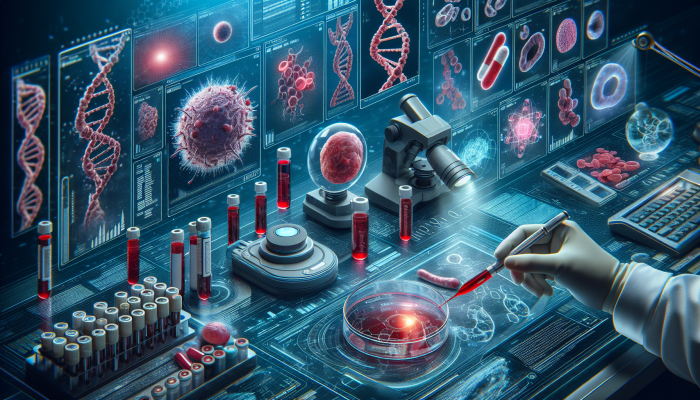Revolutionizing Cancer Diagnostics: Explore the Transformative Impact of Advanced Blood Tests and Innovative Technologies
The realm of cancer detection is undergoing a remarkable transformation, significantly enhanced by the latest innovations in blood tests for evaluating cancer risk. These state-of-the-art tests signify a crucial advancement in identifying potential cancer biomarkers found within the human body, allowing for earlier interventions and substantially improving patient outcomes. To effectively navigate the intricate and often overwhelming landscape of cancer diagnostics, it is essential to cultivate a thorough understanding of the fundamental principles that underpin these tests, alongside the groundbreaking advancements that are emerging in this vital sector of healthcare.
In-Depth Exploration of Blood Tests for Cancer Risk: A Comprehensive Analysis

At the heart of blood tests for cancer risk is the vital detection of specific biological indicators, commonly referred to as biomarkers. These biomarkers act as crucial signals that suggest the presence of potential cancer or an elevated risk of developing it in the future. They encompass a wide variety of substances, such as proteins, genes, and various other materials produced by either cancerous cells or the body’s immune response to cancer presence. The scientific foundation of these innovative tests relies on advanced methodologies designed to effectively identify these markers, leveraging a comprehensive range of cutting-edge technologies.
One of the central techniques employed in these evaluations is the liquid biopsy. This groundbreaking method involves analyzing a blood sample to detect key components such as circulating tumor DNA (ctDNA) and circulating tumor cells (CTCs). The non-invasive nature of this approach enables a thorough assessment of a patient’s cancer risk without the necessity for more invasive traditional biopsy procedures. Moreover, technological advancements, particularly in next-generation sequencing (NGS), have dramatically increased the sensitivity and specificity of these tests, allowing them to detect even the slightest traces of ctDNA.
The precision of blood tests for cancer risk is intricately linked to our understanding of cancer biology. Distinct types of cancer release unique biomarkers into the bloodstream, prompting ongoing research aimed at discovering new markers that can function as early warning signals. For instance, monitoring levels of prostate-specific antigen (PSA) is a common method used to evaluate prostate cancer risk, whereas the CA-125 marker is frequently associated with the detection of ovarian cancer. This understanding is crucial for developing effective screening protocols.
Furthermore, the incorporation of artificial intelligence (AI) in the analysis of test results is significantly transforming this field. AI algorithms possess the remarkable ability to analyze extensive datasets, uncovering patterns that might escape human detection, thus greatly enhancing the predictive capabilities of these tests. This integration of technology not only streamlines the analytical process but also fosters more accurate risk assessments and patient management.
Discovering Innovative Breakthroughs in Blood Tests for Cancer Risk: Key Advancements
The field of blood tests for cancer risk is currently experiencing impressive breakthroughs that hold the potential to redefine cancer screening and prevention methodologies. A particularly significant advancement is the introduction of multi-cancer early detection (MCED) tests. These pioneering tests are engineered to identify various types of cancer from a single blood sample, significantly reducing the necessity for invasive procedures and enhancing overall patient comfort and experience during diagnostic evaluations.
Recent research has demonstrated that MCED tests can successfully detect cancers at their earliest stages, often prior to the appearance of any clinical symptoms. This early detection is critical, as it is directly correlated with improved treatment outcomes and enhanced survival rates. For example, a study published in a reputable oncology journal highlighted the impressive capability of an MCED test to identify malignancies that are traditionally challenging to diagnose in their early phases, including pancreatic cancer and ovarian cancer. Such advancements could dramatically change patient prognosis and treatment strategies.
Another notable advancement in this domain involves the investigation of methylation patterns present in circulating DNA as a potential diagnostic tool. Alterations in methylation often signify cancerous processes, prompting researchers to explore how these patterns can be utilized for more precise cancer risk assessment. This innovative technique could offer a highly sensitive approach for detecting cancers that currently lack effective screening protocols, thereby significantly enhancing patient care and outcomes.
Additionally, collaborations between technology firms and healthcare providers are catalyzing the development of groundbreaking diagnostic tools. These partnerships aim to harness big data and machine learning to optimize blood sample analysis, leading to more accurate risk assessments and personalized management strategies tailored to individual patients’ needs.
Exploring the Transformative Power of Liquid Biopsies in Cancer Detection and Treatment Approaches
Liquid biopsies signify a revolutionary advancement in the domain of blood tests for cancer risk. In contrast to traditional biopsies that necessitate invasive tissue samples, liquid biopsies provide a minimally invasive alternative that can be performed multiple times, facilitating continuous monitoring of cancer progression or treatment responses. This capability is particularly beneficial for patients who may not be optimal candidates for surgical biopsies due to various health concerns or complications.
Liquid biopsies operate by isolating and analyzing ctDNA or CTCs extracted from a blood sample. The ability to monitor these cellular components offers invaluable insights into tumor dynamics and possible genetic mutations that may occur throughout the disease trajectory. For instance, identifying specific mutations can aid oncologists in selecting targeted therapies, thereby customizing treatment plans for greater effectiveness and improved success rates.
The integration of liquid biopsies into clinical practice is already yielding promising results. Recent clinical trials have shown that these tests can detect recurrences in patients who have previously undergone cancer treatments, often several months ahead of traditional imaging techniques. This timely detection enables prompt interventions, ultimately improving survival outcomes and overall patient health and well-being.
Moreover, liquid biopsies facilitate real-time monitoring of treatment responses. By assessing ctDNA levels during therapy, healthcare professionals can evaluate the effectiveness of the treatment regimen and make necessary adjustments to optimize patient care. This proactive monitoring approach represents a significant shift toward a more dynamic management style in cancer care, ensuring that patients receive the most appropriate treatment customized to their individual needs and circumstances.
In summary, blood tests for cancer risk, particularly through the application of liquid biopsies, are revolutionizing the landscape of oncology. Their potential for early detection, continuous monitoring of disease progression, and personalized treatment strategies positions them as invaluable tools in the ongoing battle against cancer. As research and technological advancements continue to evolve, the prospects for these tests to enhance patient outcomes and reshape cancer care remain exceptionally promising and encouraging.
Connect with Us: Join Our Facebook Community for the Latest Insights and Updates!

This Article Was First Published On https://bloodtest.co.uk
The Article: Blood Tests for Cancer Risk: Pioneering Early Detection Methods appeared first on: https://ezbloodtest.com
The Article Cancer Risk Blood Tests: Innovative Methods for Early Detection Was Found On https://limitsofstrategy.com
The Article Cancer Risk Blood Tests: Cutting-Edge Early Detection Techniques First Appeared ON
: https://ad4sc.com
Comments are closed